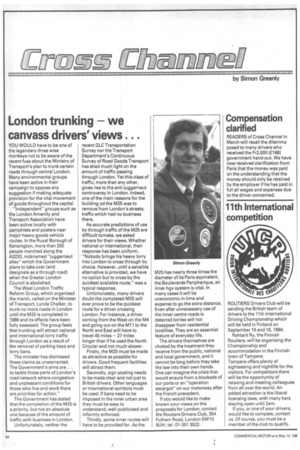London trunking — we canvass drivers' views . . .
Page 46

If you've noticed an error in this article please click here to report it so we can fix it.
YOU WOULD have to be one of the legendary three wise monkeys not to be aware of the recent fuss about the Ministry of Transport's plan to trunk certain roads through central London. Many environmental groups have been active in their campaign to oppose any suggestion if making adequate provision for the vital movement of goods throughout the capital.
"Independent" groups such as the London Amenity and Transport Association have been active locally with pamphlets and posters near major heavy goods vehicle routes. In the Royal Borough of Kensington, more than 250 people marched along the A3220, nicknamed "juggernaut alley" which the Government plans to take over {and designate as a through road) when the Greater London Council is abolished.
The West London Traffic Reform Group, which organised the march, called on the Minister of Transport, Lynda Chalker, to trunk no more roads in London until the M25 is completed in 1986 and its effects have been fully assessed. The group feels that trunking will attract national and international lorry traffic through London as a result of the removal of parking bays and lorry bans.
The minister has dismissed these claims as unwarranted. The Government's aims are ... to tackle those parts of. London's road network where congestion and unpleasant conditions for those who live and work there are priorities for action."
The Government has stated that the completion of the M25 is a priority, but not an absolute one because of the amount of traffic with business in London.
Unfortunately, neither the recent GLC Transportation Survey nor the Transport Department's Continuous Survey of Road Goods Transport has shed much light on the amount of traffic passing through London. Yet this class of traffic, more than any other, gives rise to the anti-juggernaut controversy in London. Indeed, one of the main reasons for the building od the M25 was to remove from London's streets, traffic which had no business there.
As accurate predictions of use by through traffic of the M25 are difficult tomake, we asked drivers for their views. Whether national or international, their response has been uniform. "Nobody brings his heavy lorry into London to cross through by choice. However, until a sensible alternative is provided, we have no option but to cross by the quickest available route," was a typical response.
Unfortunately, many drivers doubt the completed M25 will ever prove to be the quickest route for a driver crossing London. For instance, a driver coming from the West on the M4 and going out on the M11 to the North and East will have to travel 45 miles — 27 miles longer than if he used the North Circular and not much slower.
Firstly, the M25 must be made as attractive as possible for drivers. Good frequent facilities will attract them.
Secondly, sign posting needs to be made clear and not just to British drivers. Other languages or international symbols must be used. If bans need to be imposed in the inner urban area they must be easy to understand, well-publicised and informly enforced.
Thirdly, some inner routes will have to be provided for. As the M25 has nearly three times the diameter of its Paris equivalent, the Boulevarde Peripherique, an inner hgv system is vital. In many cases it will be uneconomic in time and expense to go the extra distance. Even after unnecessary use of the inner centre roads is deterred lorries will not diaappear from residential localities. They are an essential feature of everyday life.
The drivers themselves are choked by the treatment they receive from the public, national and local government, and it cannot be long before they take the law into their own hands. One can imagine the crisis that would ensure from a blockade of our ports or an "operation escargot" on our motorway after the French precedent.
If you would like to make known your views on the proposals for London, contact the Routiers Drivers Club, 354 Fulham Road, London SW10 9UH; tel: 01-351 3522.












































































































